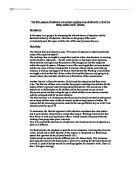Assess the view that the education system exists mainly to select and prepare young people for their future work roles.
Sociology Homework- Mrs Steward
Assess the view that the education system exists mainly to select and prepare young people for their future work roles? (20).
One perspective that supports this is the functionalist view that secondary socialisation prepares children for work later on in life. They believe secondary socialisation does this as in a school environment you learn the norms and values of authority figures, for example, the teachers. Functionalists therefore believe that this can then later be applied in the work place as the norms and values are carried on however the authority figure role changes from Teacher to Boss.
Functionalist Talcott Parsons also believe that school and society are based on meritocractic principles. Parsons claimed school to be the ‘focal socialising agency’ acting as a bridge between family and the wider society, e.g the work place. Parsons sees school as preparing us to move from family to the wider society because they are both based on meritocractic principles. In meritocracy everyone is given equal opportunities and individuals achieve rewards through their own effort and ability. This can be applied to the work place because. At work we gain promotion or get the sack on the strength of how good we are at the job, while at school we pass or fail through our own individual efforts this is how parsons believes school prepares the young for the work place.







